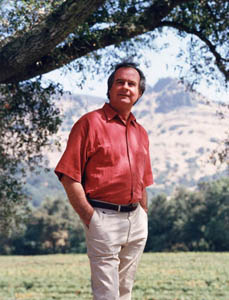The Poet-Farmer of the Napa Valley – Warren Winiarski

|
After a quiet lunch in Rutherford yesterday, I drove back home along the Silverado Trail. As rain droplets began hitting my windshield, I passed the modest sign for the winery whose founder, to me, is an almost perfect example of the idealism of many of the early vintners who came to Napa Valley, searching for an Arcadian life.
Warren Winiarski gave up his job as a lecturer at the University of Chicago, packed up his family in their station wagon, and moved to Napa Valley to begin again as a winemaker. After a short stint at Souverain Cellars, he joined the new Robert Mondavi Winery, working through the first two crushes in 1966 and 1967 before starting a winery of his own on Howell Mountain.
After just three years on his own, Warren produced the cabernet that won the 1976 Paris Tasting – an event which put Napa on the map and guaranteed the fame of Stag’s Leap Wine Cellars, the small winery he founded with his wife Barbara. More than four decades after that famous tasting, the Winiarskis decided last July to sell to Italy’s Piero Antinori and Ted Baseler of Ste. Michelle Wine Estates for $185 million.
The news of the sale shocked the wine world. But I saw the Winiarski’s decision as an elegant solution to a problem facing many of the Valley’s pioneering vintners: how to handle succession at their beloved wineries when their children aren’t either interested or necessarily the very best candidates for running it in the future.
Jon Bonne, the San Francisco Chronicle’s wine editor, had a wonderful feature on Warren in yesterday’s paper, titled “After the Leap.” Elegiac in tone, Jon’s piece noted that of Warren and Barbara’s three children “none were obviously on track to step into their father’s shoes.”
What ensued was a lot of soul-searching, he reports, particularly in the shadow of the Robert Mondavi Corp.’s forced takeover by Constellation Corp. in 2004, after the Mondavi family struggled for many years with who should succeed founder Robert Mondavi at the company.
Warren, who is now 79, was kind enough to grant me two long interviews for The House of Mondavi, as well as several sessions of follow-up questions and fact-checking. He suggested I look at the Mondavi story through the lens of some of Shakespeare’s tragedies. Of all of the hundreds of people I talked to for my book, Warren was one of my favorites.
So when I read in Jon’s piece yesterday of Warren’s plans to teach Macbeth at St. John’s College this summer, where he has lectured during summer programs for many years, I couldn’t help smiling.
I felt mix emotions for this if fortunate or unfortunate happenings. I’m not in a position to decide but his a successful businessman, if just so sad when you look or handling it for years but at the end of story for me . It was a bitter ending but who knows who is right or wrong as long as his doing good and contented I think has a great man after losing a big business he still worry for his legacy sharing his knowledge to others.
Vernice
My blog : Chauffage infrarouge